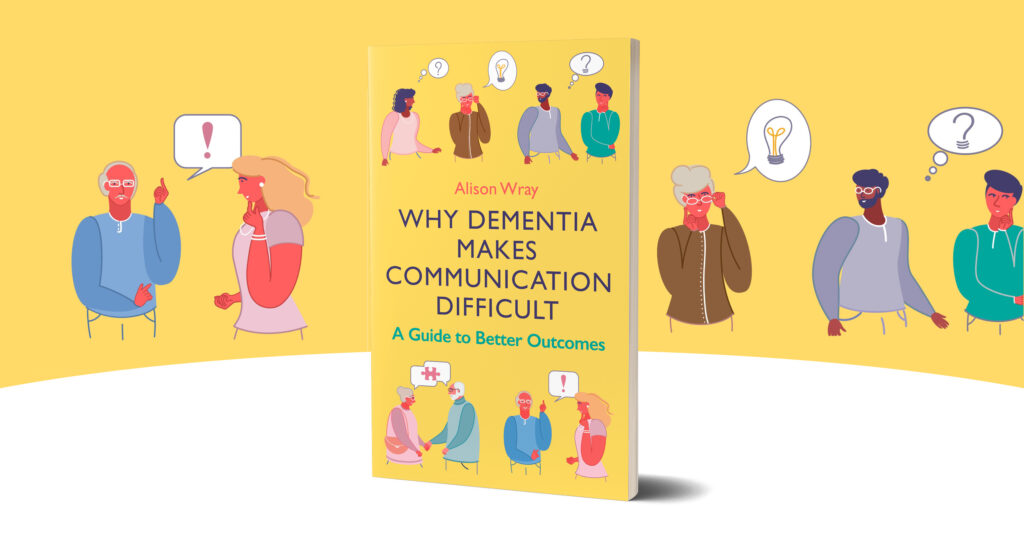
Why Dementia Makes Communication Difficult: a Guide to Better Outcomes is a new book from Alison Wray, a Research Professor of Language and Communication at Cardiff University. The book explores the underlying challenges that lead to communication breakdown in dementia. It’s aimed at people living with a dementia, their family, friends and professional carers, and ‘bystanders’ – people who occasionally encounter someone living with a dementia, such as hairdressers, bus and taxi drivers, dentists, shop assistants and so on.
It seems to me that writing a book is a bit like raising a child – with all the worry, joy, fascination and running about. Then one day there it is, standing up in its own two covers, out in the world, independent of its author. But this book is particularly special for me, as it’s my first ‘trade book’, for which read ‘book for real people rather than academics.’
Working in an area like dementia communication, it’s pretty obvious that one should be writing for ordinary, everyday people who encounter or live with dementia, but it’s not something that we academics are directly trained to do, so I had to learn how. The first step was to write a big academic book (The Dynamics of Dementia Communication, published in 2020) because that’s how I figured out not only what I know, but how I know I know it. Academic books are necessarily, and appropriately, full of references to research which back up all the claims one makes, and full of explanations and theory. With that knowledge under my belt, I felt more confident to tackle this one. It’s a much lighter touch yet the background research means I know it’s okay for my readers to trust that the evidence is there.
To my mind, communication is the most damaging aspect of living with a dementia. In an animated film I wrote about the challenges of dementia communication, I refer to dementia as a ‘communication disease’. Communication is the pipeline that connects the experiences and perceptions of one person to those of another person, so if it goes wrong, it prevents people from achieving their goals and helping others to do so.
Often the most obvious problems relate to language itself. Many people living with a dementia struggle to produce and understand words, for example. They might get stuck mid-sentence, or substitute a different word, or use vague replacements like ‘it’, ‘them’ and ‘thing’, which can make it difficult for others to work out what they’re referring to.
But in most types of dementia, there’s a much bigger problem that’s less easy to see at first – not being able to keep up with the context of a conversation. Dementia can damage people’s ability to process information quickly and to store details in memory. As a result, they might not always be sure what is appropriate to say. For instance, they might address someone as if they were someone else, or they might repeat something that’s already been said.
The problem is that when they do that, the person they’re talking to is likely to be at least surprised, and often upset or annoyed. And then they’re likely to say something back that comes as a shock to the person living with the dementia – who thought that what they’d said was entirely appropriate. We can see how easily a mixture of annoyance, confusion and embarrassment will lead to a downward spiral of negative emotions and behaviours.
The book offers many suggestions for how to get communication to work better. However, it had to be carefully done. I’m nervous of suggesting there are simple fixes, because I don’t think there are. Each person and each situation is different. So, one of the main messages is to develop an understanding of why we communicate – what we’re trying to achieve and why it matters when we don’t achieve it. That way, we’ll have more chance of standing back and asking what happened there? We’ll have a bit more distance from the emotions of the situation. We can learn to be more language aware, and experiment with different options.
This sort of ‘ownership’ of the situation makes it easier to act with kindness towards ourselves and others. The judgements we make when we are trying to be kind are based on our deep instincts and in the end, it’s our instincts that will direct us towards the most sophisticated and sensitive responses to these challenges.
Why Dementia Makes Communication Difficult: A Guide to Better Outcomes is out now.